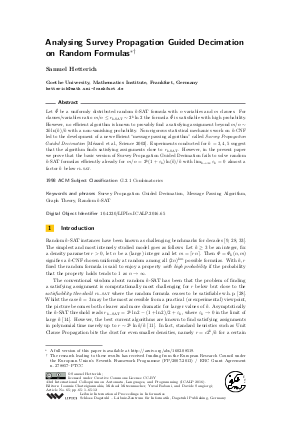Analysing Survey Propagation Guided Decimationon Random Formulas
Author Samuel Hetterich
-
Part of:
Volume:
43rd International Colloquium on Automata, Languages, and Programming (ICALP 2016)
Part of: Series: Leibniz International Proceedings in Informatics (LIPIcs)
Part of: Conference: International Colloquium on Automata, Languages, and Programming (ICALP) - License:
 Creative Commons Attribution 3.0 Unported license
Creative Commons Attribution 3.0 Unported license
- Publication Date: 2016-08-23
File

PDF
LIPIcs.ICALP.2016.65.pdf
- Filesize: 0.52 MB
- 12 pages
Document Identifiers
Subject Classification
Keywords
- Survey Propagation Guided Decimation
- Message Passing Algorithm
- Graph Theory
- Random k-SAT
Metrics
- Access Statistics
-
Total Accesses (updated on a weekly basis)
0Document
0Metadata
Abstract
Let vec(theta) be a uniformly distributed random k-SAT formula with n variables and m clauses. For clauses/variables ratio m/n <= r_{k-SAT} ~ 2^k*ln(2) the formula vec(theta) is satisfiable with high probability. However, no efficient algorithm is known to provably find a satisfying assignment beyond m/n ~ 2k*ln(k)/k with a non-vanishing probability. Non-rigorous statistical mechanics work on k-CNF led to the development of a new efficient "message passing algorithm" called Survey Propagation Guided Decimation [Mézard et al., Science 2002]. Experiments conducted for k=3,4,5 suggest that the algorithm finds satisfying assignments close to r_{k-SAT}. However, in the present paper we prove that the basic version of Survey Propagation Guided Decimation fails to solve random k-SAT formulas efficiently already for m/n = 2^{k}(1 + epsilon_k)*ln(k)/k with lim_{k -> infinity} epsilon_k = 0 almost a factor k below r_{k-SAT}.
Cite As Get BibTex
Samuel Hetterich. Analysing Survey Propagation Guided Decimationon Random Formulas. In 43rd International Colloquium on Automata, Languages, and Programming (ICALP 2016). Leibniz International Proceedings in Informatics (LIPIcs), Volume 55, pp. 65:1-65:12, Schloss Dagstuhl – Leibniz-Zentrum für Informatik (2016)
https://doi.org/10.4230/LIPIcs.ICALP.2016.65
BibTex
@InProceedings{hetterich:LIPIcs.ICALP.2016.65,
author = {Hetterich, Samuel},
title = {{Analysing Survey Propagation Guided Decimationon Random Formulas}},
booktitle = {43rd International Colloquium on Automata, Languages, and Programming (ICALP 2016)},
pages = {65:1--65:12},
series = {Leibniz International Proceedings in Informatics (LIPIcs)},
ISBN = {978-3-95977-013-2},
ISSN = {1868-8969},
year = {2016},
volume = {55},
editor = {Chatzigiannakis, Ioannis and Mitzenmacher, Michael and Rabani, Yuval and Sangiorgi, Davide},
publisher = {Schloss Dagstuhl -- Leibniz-Zentrum f{\"u}r Informatik},
address = {Dagstuhl, Germany},
URL = {https://drops.dagstuhl.de/entities/document/10.4230/LIPIcs.ICALP.2016.65},
URN = {urn:nbn:de:0030-drops-62197},
doi = {10.4230/LIPIcs.ICALP.2016.65},
annote = {Keywords: Survey Propagation Guided Decimation, Message Passing Algorithm, Graph Theory, Random k-SAT}
}
